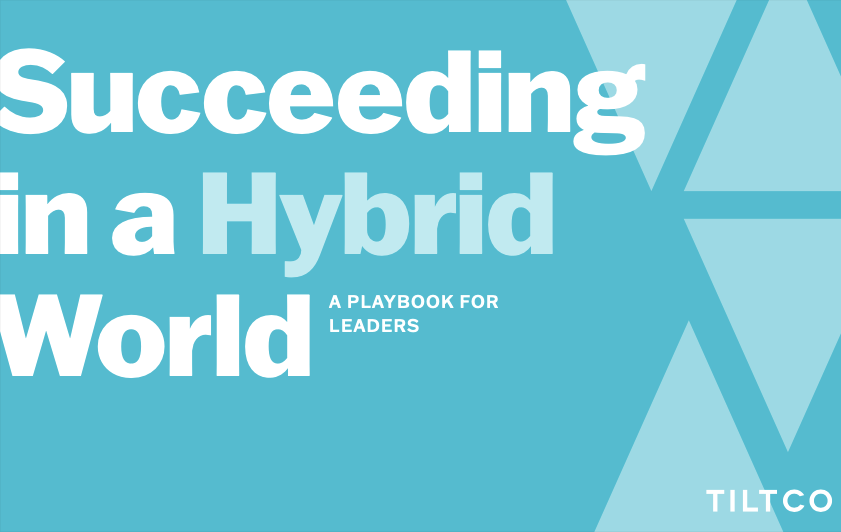Hybrid Workplace Series: How leaders can support middle managers in a hybrid work environment
This second discussion on hybrid captures insights and practical ideas from business leaders, consultants and academics on how leaders can support their middle managers in hybrid workplaces as we emerge from the pandemic over the next 18 to 24 months.
Middle managers are a powerful force in organizations. As companies look ahead and consider the move to hybrid workplaces – that is where there is a mix of in-person and remote work happening – they’ll want to focus on enabling their middle managers to be true people leaders who can coach, motivate and set pace for the people on their team to work towards the company’s goals.
TITLCO Inc. gathered business leaders, consultants and academics for a series of Roundtable discussions to capture insights and practical ideas that leaders can use as they re-imagine their organizations over the next 18 to 24 months.
In this special LeaderLab series, our Roundtable participants offered leaders the following prescriptions:
- Move away from “face time” as a metric and support middle leaders to manage to outcomes and impact. As Lisa explains: “We’re in a transition truly to a knowledge economy where you really have to be able to assess what is the impact this employee is creating, not how many hours they were online.”
- Upskill middle managers on the human-side of leadership as they may be the only contact between individual employees and the organization. Susan explained this requires leaders to rethink manager training: “It’s not just manager training in the way they thought, but we need training for people to be effective during remote work.”
- Coach and equip middle managers to talk about trust in order to build it. Here’s what Reid had to say: “It’s really tough to talk about trust, but is there anything more powerful that will actually make you want to change than hearing that someone doesn’t trust you?”
- Take care of your managers’ psychological and physical well-being, so they can do the same to the people on their teams. Aneta offered a mantra that leaders can use to model positive well-being and tie it back to the business imperative: “When I take care of myself and my team, I take care of business.”
- Role model the new expectations of hybrid for their middle managers, so they can cascade these new norms to their teams. Nils had this to say about it: “You have to show middle managers that they should want to change and that they need to change… and showcase what they should be striving for, and then provide the opportunity to get the support for it.”
Read more insights captured at our Roundtable discussion:
Subscribe to LeaderLab to be notified of our next episode in this special Roundtable series.

Download the Leader Playbook to access practical insights and ideas that will help you be a better leader in a hybrid context.
Meet our Panelists
A special thank you to Will Bachman, managing partner of Umbrex, for his help in bringing these roundtables together. Learn more about the work that Umbrex does connecting independent consultants with one another at www.umbrex.com.
Thank you to our panelists:
- Nils Boeffel, principal consultant at Boeffel Consulting that focuses on digital strategy and agile transformation. Connect with Nils on at https://boeffel.net/.
- Susan Charnaux is principal and founder at Fairhill Ventures that focuses on strategic guidance on talent and culture change. Learn about Susan’s work at her website: https://www.fairhillventures.com/ and connect with her on LinkedIn: https://www.linkedin.com/in/susan-charnaux/
- Kelly Duffin is an experienced strategy and transformation leader. Connect with Kelly on LinkedIn: https://www.linkedin.com/in/kellyduffinmba/.
- Lisa Dymond is partner and head of talent at Atlas Partners, a private equity investment firm. Connect with Lisa on LinkedIn: https://www.linkedin.com/in/lisa-dymond-nee-wiens-b84678/
- Aneta Key is a strategic growth advisor at Aedea Partners LLC. Connect with Aneta on LinkedIn: https://www.linkedin.com/in/anetakey/.
- Amanda Setili is the president of Setili & Associates that focuses on organizational performance improvements. Learn more about Amanda’s work on her website at https://setili.com/ and connect with her on LinkedIn: https://www.linkedin.com/in/amandasetili/.
- Reid Wuntke is president at Energy Toolbase, developers of economic modeling software. Connect with Reid at https://www.linkedin.com/in/reidwuntke/.
About TILTCO
TILTCO is a boutique consulting company that helps leaders define and execute their strategies in order to achieve extraordinary business and personal results. Founded by Tineke Keesmaat, she brings her 20 years of leadership consulting experience rooted at McKinsey & Company and Accenture to supports today’s leaders achieve exceptional results.